

Some lessons still need to be learned. » Education Roundtables. It’s Saturday evening, and sitting here with what I can only describe as a ‘fuzzy head’ from far too many home-made gins during the previous day’s VE celebration, my head is swimming with thoughts about tomorrow’s government announcement.
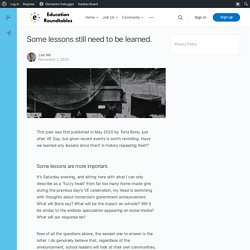
What will Boris say? What will be the impact on schools? Will it be similar to the endless speculation appearing on social media? What will our response be? Now of all the questions above, the easiest one to answer is the latter. However, it did get me thinking about whether there are comparisons between our current situation and that of our predecessors. At least that’s what I thought… Thousands Who Got COVID-19 in March Are Still Sick. Editor’s Note:The Atlantic is making vital coverage of the coronavirus available to all readers.
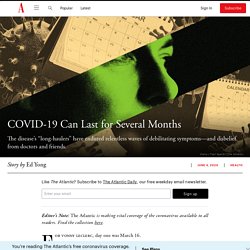
Find the collection here. For Vonny LeClerc, day one was March 16. Hours after British Prime Minister Boris Johnson instated stringent social-distancing measures to halt the SARS-CoV-2 coronavirus, LeClerc, a Glasgow-based journalist, arrived home feeling shivery and flushed. Over the next few days, she developed a cough, chest pain, aching joints, and a prickling sensation on her skin. After a week of bed rest, she started improving. To hear more feature stories, get the Audm iPhone app. When I spoke with LeClerc on day 66, she was still experiencing waves of symptoms. COVID-19 has existed for less than six months, and it is easy to forget how little we know about it. Read: Why some people get sicker than others I interviewed nine of them for this story, all of whom share commonalities.
Read: What will you do if you start coughing? UK COVID-19 Tracker. This is a collection of what I consider to be the most useful COVID-19 data for the UK.
It is updated from the latest source data every 30 minutes. The majority of the data here is for England at the moment. The other nations of the UK compile their data separately and some of it is not directly comparable. Regional Trends While governments are keen on using the reproduction (R) number to measure the state of outbreaks, it's ultimately just a measure of whether a certain metric is growing or shrinking. Center on Reinventing Public Education. In times of crisis, knowledge must flow freely and quickly.

The COVID-19 pandemic created just such a crisis in K-12 education. Under these circumstances, research can pay huge dividends. It can help practitioners and policymakers identify and assess emerging innovations. It can help them anticipate conditions ahead—such as multiple waves of closures, the need to maintain social distancing even after students return to campuses, major cuts in school funding, and efforts to address varied and significant student learning losses—that will force further changes. Research is needed. The Big Community Sew. COVID-19: 10 tech trends getting us through the pandemic. The COVID-19 pandemic has accelerated 10 key technology trends, including digital payments, telehealth and robotics.
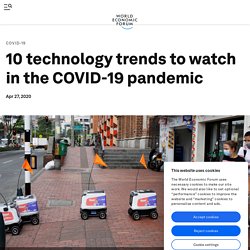
These technologies can help reduce the spread of the coronavirus while helping businesses stay open. Technology can help make society more resilient in the face of pandemic and other threats. During the COVID-19 pandemic, technologies are playing a crucial role in keeping our society functional in a time of lockdowns and quarantines. And these technologies may have a long-lasting impact beyond COVID-19. Here are 10 technology trends that can help build a resilient society, as well as considerations about their effects on how we do business, how we trade, how we work, how we produce goods, how we learn, how we seek medical services and how we entertain ourselves.
Leading through coronavirus: strategy, sweet spots and shifting to sustaining. Crisis Covid-19.

Crashing into online learning: a report from five continents – and some conclusions. I am beginning to come across reports of how different countries around the world are moving to online learning as a result of Covid-19, and the results are not pretty.
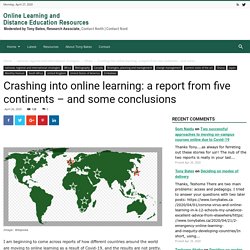
I have selected reports from sub-Saharan Africa, Iran, Japan, the UK, Canada and the USA. Now I have to say that the selection below is by no means a stratified random sample – the emphasis here is on random – but they are nevertheless interesting and certainly revealing. Africa. Social distancing app uses space to save lives. A free app that helps people observe social distancing to slow the spread of coronavirus is about to launch.
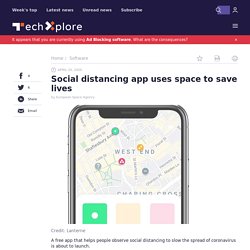
Devised by Lanterne, a UK start-up company supported by ESA, it uses satellite data and artificial intelligence technologies to identify where people are congregating anywhere in the world. People who need to leave home to go to the supermarket or the pharmacy can check before they depart whether the shops are becoming crowded. If there are too many people, they can delay their trip until its less busy or switch to less-crowded shops nearby. EJE Guidance: Managing Adrenal Insufficiency in the time of COVID-19 - 21/04/2020. In response to the unprecedented COVID-19 pandemic, the European Journal of Endocrinology (EJE) editoral board has commissioned a new guidance series for the management of endocrine conditions during COVID-19.

Included within this is clinical guidance for the management of Addison's disease and adrenal insufficiency. New Video: Managing medication and COVID-19. In our latest video, ADSHG Trustee and Professor of Endocrinology Professor Simon Pearce, explains how to manage your medication should you get ill in the coming weeks.

This video contains general principles only and does not replace the advice of your own doctor or endocrinologist. The symptoms and manifestations of COVID-19 (coronavirus) may be quite variable from person to person and we are learning more all the time. Seek specialist advice urgently should you feel very unwell. This video was created by the Addison's Disease Self Help Group for people with Addison's Disease and Adrenal Insufficiency. Transcript of the Managing Medication and COVID-19 Video. COVID-19 Rapid Evidence Review: Exit through the App Store? Exit through the App Store? A rapid evidence review of the technical considerations and societal implications of using technology to transition from the COVID-19 crisis was undertaken with a view to supporting the Government and the NHS as it adopts technical solutions to aid in the transition from the COVID-19 crisis.
Download Exit through the App Store? 1MB Colour PDF The review focuses on three technologies in particular: digital contact tracing, symptom tracking apps and immunity certification. Coronavirus tracked: the latest figures as the pandemic spreads. FT Visual & Data Journalism team November 10, 2020 Print this page The human cost of coronavirus has continued to mount, with more than 50.2m cases confirmed globally and more than 1.24m people known to have died. The World Health Organization declared the outbreak a pandemic in March and it has spread to more than 200 countries, with severe public health and economic consequences. Oxford COVID-19 Evidence Service - CEBM. Rapid reviews of primary care questions relating to the coronavirus pandemic, updated regularly. Five education myths that Covid-19 shatters.
Education has been practised and conceptualised internationally in ways that demonstrate its increasing privatisation, enabled through a dependency on numerical data and an adherence to a social world that is constructed and distorted through these numbers. We argue that Covid-19 signifies, first, the catastrophic failure or irrelevance of the technologies of privatisation to addressing the pandemic’s exigencies and implications, and, second, the necessity of a public form of education to address the post-pandemic landscape. We do this through showing how five strong claims associated with contemporary education policy and practice have been revealed by Covid-19 to be myths, whose maintenance is a luxury made possible only in relatively stable times, and even then only through hard policy work made invisible through now demonstrably false claims that There Is No Alternative.
Myth 1: Teacher and leader efficacy can provide the solutions to children’s academic failure Conclusion. Policy Review: Literature to Inform COVID-19 Mitigation Following Community Reopening. This policy review compiles evidence from multiple public health and sector-specific data sources on influenza and pandemic concepts, as well as COVID-19-specific proposals. Its intended use is to inform the discourse around the public health infrastructure needed for safely reopening our communities following the first peak of the epidemic in the U.S. It is a living document, and as such we welcome expert feedback and additions—please reach out to Meredith Matone (MatoneM@email.chop.edu) or Deanna Marshall (MarshallDB@email.chop.edu).
In summary, the policy review focuses on three crucial domains: Covid-19 and Information Literacy: a selective list of useful resources. Blog posts: Estimating the number of infections and the impact of nonpharmaceutical interventions on COVID-19 in 14 European countries - Imperial College London. University students and COVID-19 FAQ - Education in the media. Answers to frequently asked questions from university students on how the coronavirus might impact higher education. Universities Minister Michelle Donelan:
Released today: a free information book explaining the coronavirus to children, illustrated by Gruffalo illustrator Axel Scheffler. Axel Scheffler has illustrated a digital book for primary school age children, free for anyone to read on screen or print out, about the coronavirus and the measures taken to control it. Coronavirus (COVID 19): list of online education resources for home education. We have brought together an initial list of online educational resources to help children to learn at home. Protecting the psychological health of children through effective communication about COVID-19 - The Lancet Child & Adolescent Health. After COVID-19: The Longer-Term Impacts of the Coronavirus Crisis on Education - Monash Education Futures. Coronavirus tracked: the latest figures as the pandemic spreads.
Patricia Farrington sur Twitter : "These green dots are local radio stations. Touch the green dot and play the local radio station. It is overwhelming. You can listen to any radio station in the world! Some stations are too good. T. Joe Wicks — the social media influencer helping keep kids fit during Covid-19. Dr Wasim Ahmed, University of Newcastle, UK; Dr Opeoluwa Aiyenitaju, Manchester Metropolitan University, UK; Professor Simon Chadwick, Emlyon Business School, France; Dr Alex Fenton, University of Salford, UK. CALLING REMOTE TEACHERS 1. Open Powerpoint 2. Create your slides 3. Type your narration into the slide notes 4. Upload PPT 5. Download it as a fully narrated, shiny new video & share with class □♂️ Retweet & follow if you're interested. I'll DM 5.
I made a video about managing #mentalhealth whilst on coronavirus lockdown. I hope it helps someone xx #workingfromhometips #COVID19. A collaborative guide to COVID-19 care. Coronavirus silver-linings: Jack Black is now on Tik Tok... Quarantined Brits Play Recorder From Balconies. Police in Andorra. Keeping children entertained during the Coronavirus lockdown by performing “Baby Shark”. THIS is the Twitter content I’m here for...□□❤️□❤️□ Thinking ahead about post-compulsory education and training. By @AoCDavidH. Universities in lockdown: the good, the bad and the ugly of online teaching. Universities across Europe are grappling with digital problems, after the COVID-19 pandemic forced campuses to shut down and move research and teaching online.
Digital capabilities are not distributed equally across European universities, and deficiencies have delayed implementing systems for online teaching. Bandwidth and student access to computers is also an issue. According to UNESCO, since the outbreak of COVID-19 began, some 1.37 billion students in 138 countries worldwide have been affected by school and university closures. Nearly 60.2 million school teachers and university lecturers are no longer in the classroom.
Italy was the first country in Europe to completely shut down its universities and move teaching online. 5 Strategies for writing in turbulent times. For many academics currently working from home, writing will be a secondary consideration, or even impossible. However, for others writing can be an essential way to maintain a sense of stability and to meaningfully respond to the current situation. For certain kinds of research academic writing may now even be more vital than ever. For those looking to write, Chris Smith discusses how to manage distraction and presents five strategies for maintaining focus, whilst at the same time acknowledging that sometimes the best thing to do is to just stop. These are extraordinary times and if you’re unable to write, the simple answer is to stop, give yourself a break and attend to what matters most in your life. Saying that, I work with academic writers every day and I know many want to write – out of necessity, or because it can bring a sense of normality in testing times – but are finding it hard to stay focused. 1.
Observe, the distractions you experience, note down and don’t judge. 2. 3. 4. (48) Ben Marsh - This is the last one we are going to do on a lockdown... AR sur Twitter : "Try again. What do you think @MartyKapow @brianmoore666 @MichelleTaupau @AndrewVossy @NRL @SonnyBWilliams @England_RL @RFU @SSFCRABBITOHS @WalesRugby @WorcsWarriors @WaspsRugby @LeicesterTigers Retweets would make their day! My boy is fi. Every dog in Britain right now… Vital social distancing advice… Daniel Keohane sur Twitter : "This is an awful time for us Europeans, for all the world. But do take the time to enjoy the Rotterdam Philharmonic play “Ode to Joy” in isolation - playing together in perfect harmony even though they are physically apart: h. @Gwenelope… When the #quarantine is over, I want to buy this man dinner. Who is he? This might be the best thing I've seen in weeks.…
Everything about this is Oscar-worthy #CoronaLockdown… Love this. Amazing where people can find humour in time of need… ReportCOVID – Self-reporting of COVID19 cases.